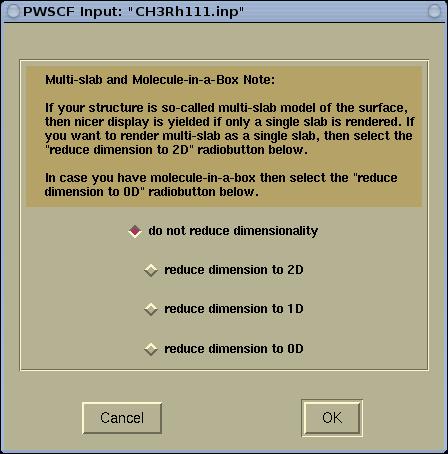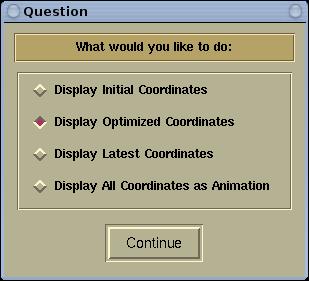XCrySDen can display the
crystal (or molecular) structures from the
PWscf input and output files (here the
pw.x code is meant).
Before visualizing the structure, the program will query for
possible reduction of the structure's dimension (here periodic
dimensions are meant). For example, molecule has zero periodic
dimensions, while surface (slab) has two periodic dimensions,
therefore it is recommended to display them with the appropriate
number of periodic dimensions.
Here is the periodic query window:

The crystal (or molecular) structure from the
pw.x input
file can be displayed either by the appropriate command line option
or from the menu.
From command-line:
- either: xcrysden --pwi file
- or: xcrysden --pw_inp file
Frome menu: select the menu item
File-->Open PWscf ...-->Open PWSCF Input
File
The crystal (or molecular) structure from the
pw.x input
file can be displayed either by the appropriate command line option
or from the menu.
From command-line:
- either: xcrysden --pwo file
- or: xcrysden --pw_out file
Frome menu: select the menu item
File-->Open PWscf ...-->Open PWSCF Output
File
There are four types of coordinate extraction modes, and this
will be queried with the following window:

Below is the description of the four types of extraction
modes.
The
Display Initial Coordinates mode will display the
initial coordinates printed at the beginning of the
pw.x
output file, i.e., those printed in the following manner:
site n. atom positions (a_0 units)
1 H tau( 1) = ( -.1657590 -.0955104 1.2559945 )
2 H tau( 2) = ( .1659009 -.0954643 1.2557377 )
3 H tau( 3) = ( .0000000 .1917322 1.2548077 )
4 C tau( 4) = ( .0000000 .0000000 1.1886906 )
5 Rh tau( 5) = ( .0000000 .0000000 .8054534 )
6 Rh tau( 6) = ( .7499998 -.4330126 .8054534 )
7 Rh tau( 7) = ( .4999998 .0000000 .8054534 )
8 Rh tau( 8) = ( .2499999 -.4330126 .8054534 )
9 Rh tau( 9) = ( -.2499999 .1443376 .4082482 )
10 Rh tau( 10) = ( .0000000 -.2886750 .4082482 )
11 Rh tau( 11) = ( .4999998 -.2886750 .4082482 )
12 Rh tau( 12) = ( .2499999 .1443376 .4082482 )
13 Rh tau( 13) = ( -.4999998 .2886750 .0000000 )
14 Rh tau( 14) = ( -.2499999 -.1443376 .0000000 )
15 Rh tau( 15) = ( .2499999 -.1443376 .0000000 )
16 Rh tau( 16) = ( .0000000 .2886750 .0000000 )
The
Display Optimized Coordinates mode will display the
optimized coordinates, therefore this mode is useful only for the
output file of geometry optimizations. If the optimized coordinates
are not found in the output file, the program will signal an error.
The optimized coordinates are printed in the following manner in
the output file:
End of BFGS geometry calculation
Final energy = -1226.4092020951 ryd
Saving the approximate inverse hessian
CELL_PARAMETERS (alat)
1.000000000 0.000000000 0.000000000
0.000000000 1.414213562 0.000000000
0.000000000 0.000000000 3.150000000
ATOMIC_POSITIONS (alat)
O -0.000066379 -0.513244840 1.345933583
N 0.000016050 -0.730745427 1.464247866
N -0.000018075 -0.898866014 1.326587159
Pd -0.000083375 -0.711492446 1.013218636
Pd 0.499979720 -0.706754811 0.987470168
Pd 0.000094941 0.000039404 0.983520698
Pd 0.500073136 0.000254615 0.980957462
Pd -0.248933604 -0.357455663 0.757427630
Pd 0.248979012 -0.357447626 0.757410448
Pd -0.248500404 0.358259400 0.758511634
Pd 0.248539175 0.358243548 0.758490039
Pd 0.000000000 -0.707106780 0.500000000
Pd 0.500000000 -0.707106780 0.500000000
Pd 0.000000000 0.000000000 0.500000000
Pd 0.500000000 0.000000000 0.500000000
Pd -0.250000000 -0.353553390 0.250000000
Pd 0.250000000 -0.353553390 0.250000000
Pd -0.250000000 0.353553390 0.250000000
Pd 0.250000000 0.353553390 0.250000000
Pd 0.000000000 -0.707106780 0.000000000
Pd 0.500000000 -0.707106780 0.000000000
Pd 0.000000000 0.000000000 0.000000000
Pd 0.500000000 0.000000000 0.000000000
The
Display Latest Coordinates mode will display the latest
coordinates in the output file. If the latest printed coordinates
are the optimized coordinates, then these will be displayed.
The
Display All Coordinates as Animation mode will display
the all the coordinates found in the output file, including the
initial coordinates. This mode is useful for geometry optimizations
and molecular dynamics calculations. The user will have the
possibility to animate forth and back through all the "images" of
the involving structure during the calculation.
Whenever a given crystal structure is displayed by
XCrySDen, it is possible to
graphically select a k-path for the band structure calculation
(
spaghetti plot) via the
Tools-->k-path Selection menu.
Read here the description of how to select
graphically the k-path.
IMPORTANT: to save the selected k-path in the format
compatible with the PWscf, make sure to save the file with the
.pwscf extension (example: my_kpath.pwscf).
To visualize charge densities, STM images, and similar properties
with
XCrySDen user needs
to calculate this property and store the data into the
XSF format. Here is the
sequence of the PWscf tasks that needs to be performed:
- the SCF calculation: pw.x < pw_input >
pw_output
- the post-processing calculation, where a given property is
selected and an XSF format
specified:
pp.x < pp_input > pp_output

![[Figure]](img/xcrysden-picture-small-new.jpg)

![[Figure]](img/xcrysden-picture-small-new.jpg)